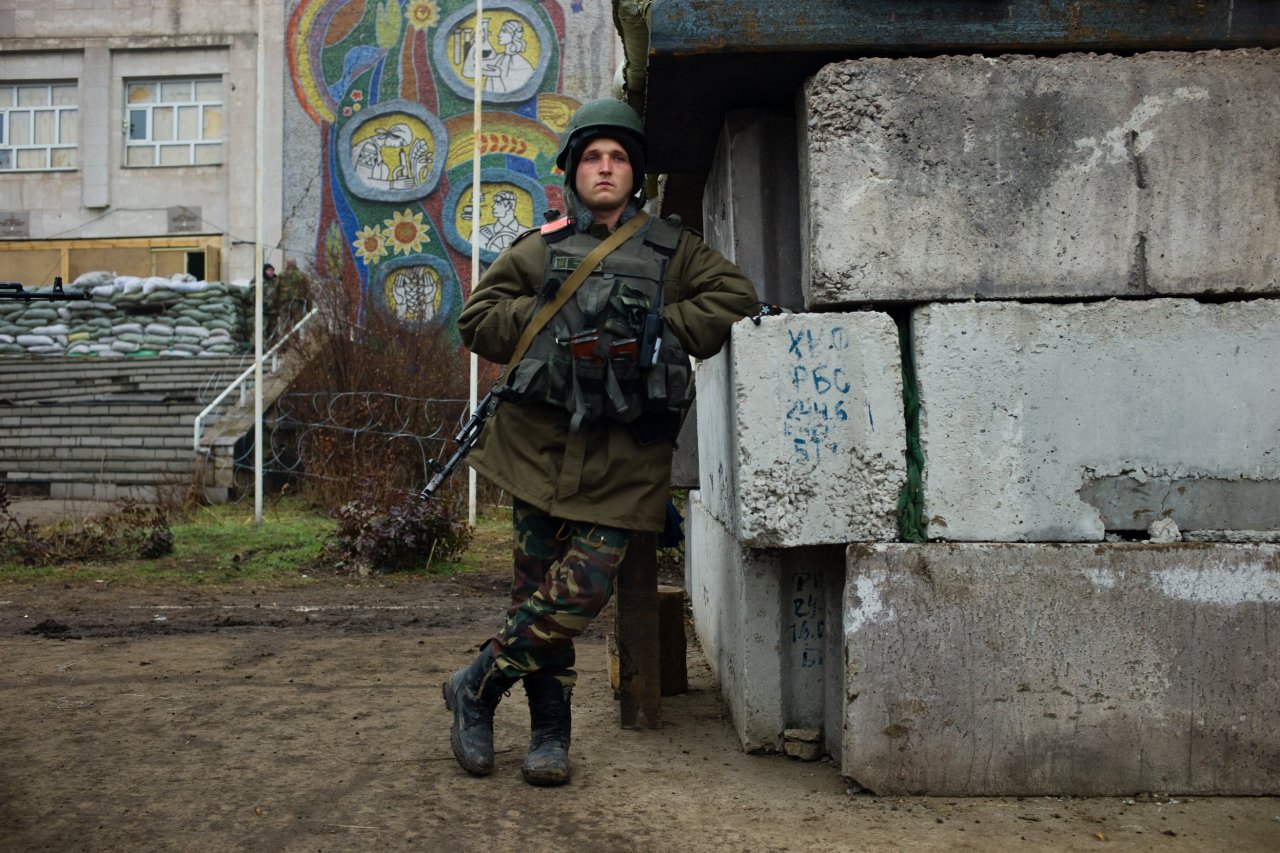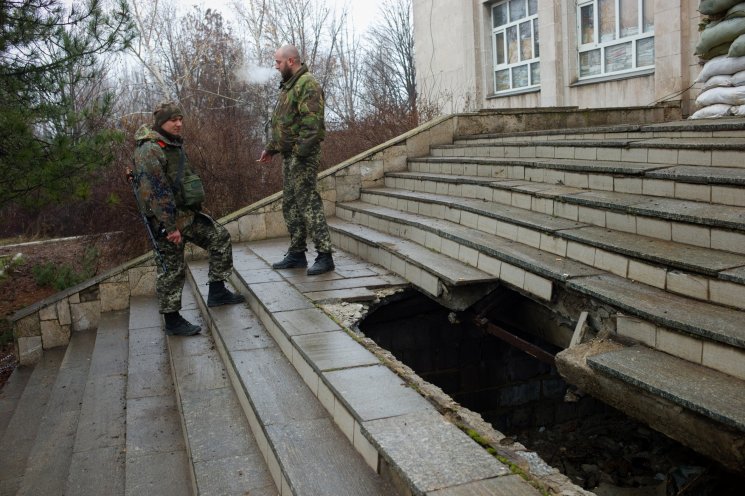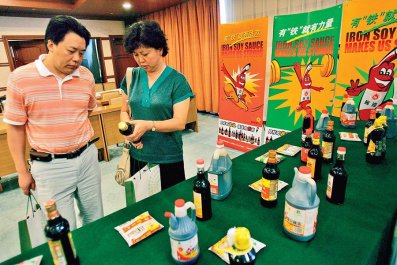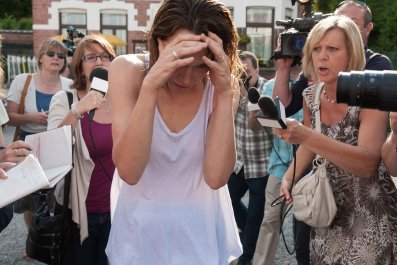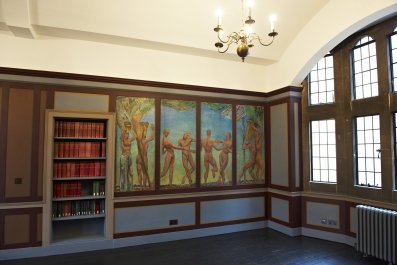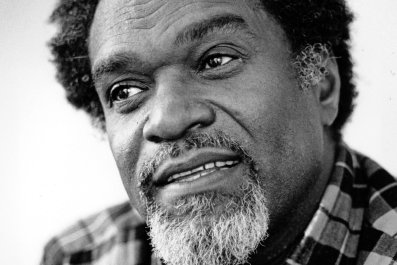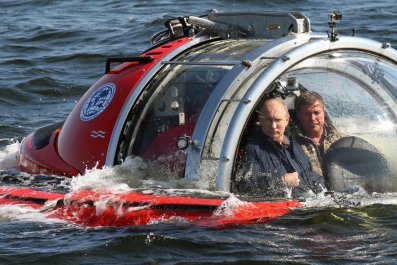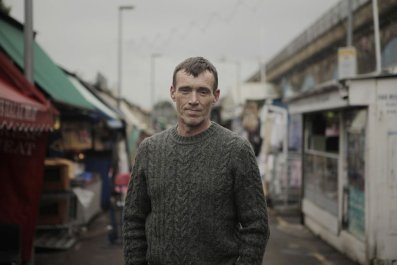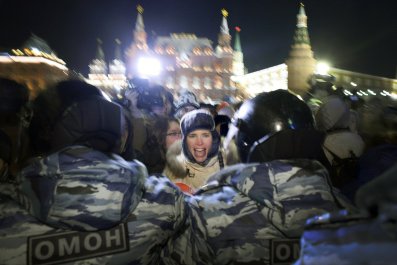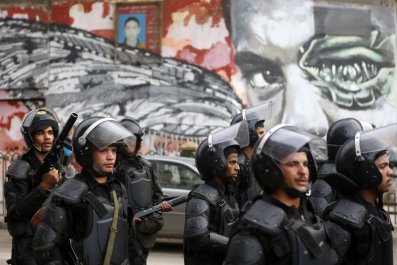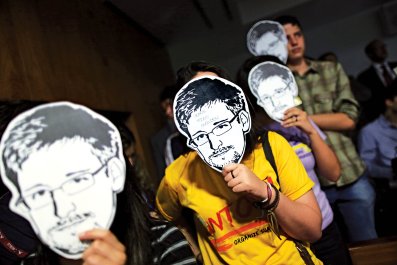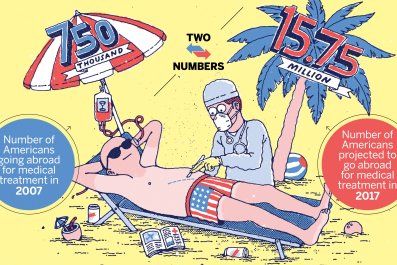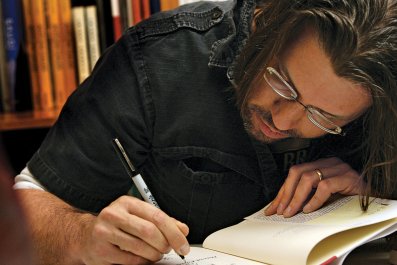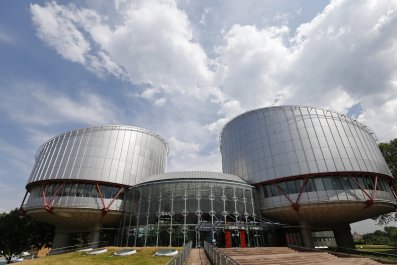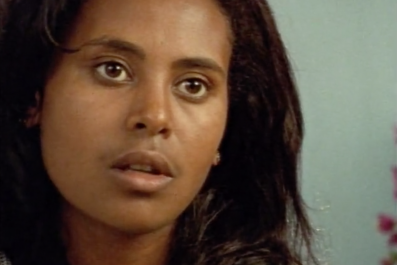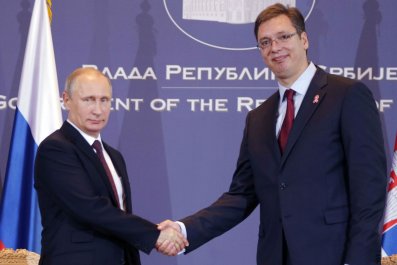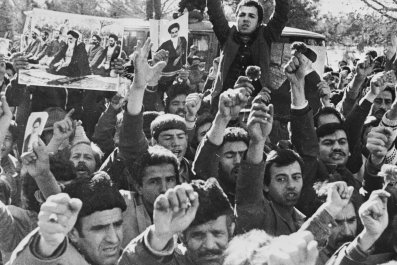Mariupol Mayor Yury Khotlubei convenes his war council in a drafty hall in the former Continental Hotel, a mint-green palace built more than a century ago. Forty men sit before him in white plastic lawn chairs, several in fatigues and one with an assault rifle slung across his back. One by one, as Khotlubei barks out their last names, they rise to report on the status of policing, utilities and the delivery of supplies to the Ukrainian soldiers dug in on the outskirts of town.
A giant Christmas tree with no decorations looms in the corner. The faded hotel will have to do, as Khotlubei's city hall is a burned-out shell, the result of fighting between pro-Russian militants and government troops before Kiev reasserted its authority over Mariupol in June. The steel town of half a million has since become the unlikely outpost of Ukrainian power in Donbas, the Donetsk coal basin torn apart by a Kremlin-backed insurgency. Khotlubei, 70, a political chameleon who has run the city for most of the past 25 years, has likewise become an unlikely Ukrainian patriot. The frayed cuffs on his shirt attest to his longevity—and the hard times Mariupol faces as a front-line city.
"The city was vulnerable. We didn't have enough tanks and artillery to hold back the aggressors," Khotlubei says, recalling the first days of September when separatists reinforced by Russian army troops pushed toward Mariupol from the Russian border, 30 miles away. "Now we are an impregnable fortress."
Mariupol, perched on the Sea of Azov, is the only port in Donbas and lies in the path of a possible corridor between Russia and the Crimean Peninsula, which Russian President Vladimir Putin annexed in March. A September 5 cease-fire halted the rebel offensive, giving the city a respite to shore up its defenses. Yet while no territory has changed hands since then, sporadic firefights and shelling have taken a heavy toll. Almost a third of the 4,700 dead in the eight-month conflict have been killed since the beginning of the cease-fire, according to the United Nations.
What diplomats refer to as the "line of contention," the defenders of Mariupol simply call "the front." The biggest danger to Ukraine's fragile independence is that the cease-fire line hardens into a de facto border, hobbling the country's Western integration and dividing Europe with a new Iron Curtain. Having lost control over hundreds of miles of its border with Russia, Ukrainian President Petro Poroshenko is at the mercy of whatever Putin throws his way. Ukrainian intelligence counted 250 tanks, 400 armored fighting vehicles and almost 1,900 trucks crossing from Russia over a six-week period in the fall.
Attempts to renew peace talks in Minsk, Belarus, have faltered, even as the Ukrainians imposed a "regime of silence" to reduce tensions along the cease-fire line. The world is now watching to see how Putin reacts as the United States and the European Union tighten sanctions that are already hurting the Russian economy. The ruble fell 40 percent against the dollar in 2014. The Ukrainian hryvnia fared even worse, losing almost half of its value last year.
Mariupol is a city awash with rumors about saboteurs, spies and imminent attack. In mid-December, a video showing a rebel column with the words To Mariupol painted on the side of armored personnel carriers appeared on YouTube. The next day, a local news site ran a headline saying, "No reason for panic." There are almost daily reports of Russian reconnaissance drones over the city's defenses, and in late December a railway bridge was damaged in an explosion. Even supporters of the Kiev government concede that the city is split into three more or less equal parts: one pro-Ukrainian, the second pro-Russian and the third indifferent "as long as there is no war."
The city's economic survival depends on two huge steel mills owned by Rinat Akhmetov, Ukraine's richest man. After then-president Viktor Yanukovych fled to Russia following the bloody Maidan protests in Kiev last winter, Akhmetov avoided taking sides for months, waiting to see who would prevail in the struggle for Donbas: the bumbling provisional government in Kiev or the pro-Russian separatists, who were seizing one administrative building after another.
When Akhmetov finally decided that his fortune would be at greater risk in an unrecognized gangster state, it was almost too late. The billionaire made panicked video appeals and paid his Mariupol steel workers $25 bonuses to go on 12-hour patrols in the increasingly lawless city. Khotlubei says that the town's steelworks are working at 70 percent capacity because coal mines in rebel-held areas have been shut down and rail links severed. Only two daily passenger trains now connect the city to the rest of Ukraine, and the Mariupol port has seen export cargos drop by more than 40 percent, according to port director Alexei Rosinsky. With supplies uncertain, businesses can't plan more than a few days in advance.
The worst-case scenario for 2015 is that pro-Russian forces renew their attack, concentrating on Mariupol to break through a land bridge to Crimea, says Ihor Todorov, an international relations professor who fled Donetsk in July and now teaches in Uzhhorod in western Ukraine. The best case would be a successful Ukrainian counterattack to liberate Donbas, he says. "The most realistic scenario is preservation of the status quo. Endless, useless talks in the 'Minsk format,' no active combat—but terrorist acts on a permanent basis."
On the northern approaches to Mariupol, vehicles line up to be checked before entering the city, their headlights yellow smudges in the fog. Donetsk, once the regional center 60 miles away, is now the capital of a self-proclaimed "Donetsk People's Republic," which even the Kremlin doesn't recognize. If a significant portion of the region's population believed that a sham independence referendum in May would be enough to trigger a Crimea-style annexation, it has become clear that the local inhabitants are pawns in Putin's campaign to make Ukraine ungovernable. Months of shelling and an economic blockade by Poroshenko have undermined any remaining loyalty to Ukraine.
"Kiev is to blame for everything. They're traitors, and they should all be put on trial," says Alla Vasilenko, who traveled down from Donetsk to pick up her monthly pension of less than $100. Because her bank is facing liquidity problems, Vasilenko and other pensioners picket the same branch every day in hopes of withdrawing the daily limit of about $20. "Europe gives them money, and they put it in their pockets or buy weapons," she says.
The suffering of the civilian population is even starker in the village of Sartana, on the edge of Kiev's zone of control. Bunches of wilted flowers, soaked by the winter rain, lie on the roadside where a Grad missile killed seven villagers taking part in a funeral procession in October. The likely target was a collective farm up the road that Ukrainian border guards have turned into their base. The unit, normally stationed 800 miles to the west near Poland, is now tasked with guarding an arbitrary boundary line well inside the country. "An artilleryman has his duties, we have ours," the unit commander, Major Valeriy Shchesnyak, says laconically.
Behind one of their checkpoints, Shchesnyak's men have set up camp in a dried-out reservoir. It was not government contractors with exorbitant day rates who dug out the underground bunkers, rigged them with electricity and installed wood-burning stoves—the border guards built everything with their own hands. In a country ravaged by corruption and teetering on bankruptcy, the defense of the nation has become a D.I.Y. undertaking. The food in the field kitchens, as well as body armor and helmets, are donations from ordinary Ukrainians. Schoolchildren's drawings paper the walls of the bunkers.
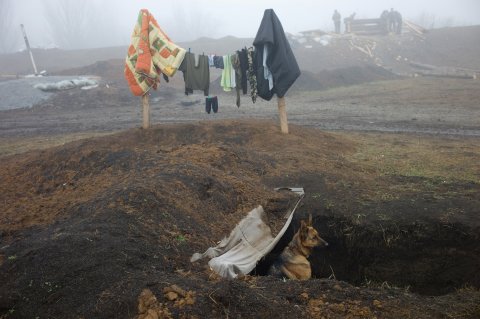
The most crucial citizen contributions are the volunteer battalions that came to the aid of the underfunded, demoralized military, which was unable to suppress the pro-Russian uprising on its own. Konstantin Batozsky, an adviser to liberal Mariupol politician and businessman Sergei Taruta, discounts as "total nonsense" the accusation that the battalions are fascist paramilitaries. "There are many questions about the battalions, but they are made up of people who are ready to die for Ukraine every day," Batozsky says. "War always attracts strange characters."
The strangest character on the Mariupol front may be Dmytro Korchynsky, 50, who helped found the St. Mary's Battalion as an explicitly Christian unit following the September cease-fire. Korchynsky last made news when he fled Ukraine a year ago after being accused of provoking violence against the police during the Maidan protests. Now he drives around Mariupol in a double-cab Toyota Tundra with a camouflage paint job, armed with a Steyr assault rifle and Jericho pistol.
"Christianity should be practiced as it was in the 13th century," says Korchynsky. "War for faith is the best thing that can happen in a person's life. It should happen all over the world, and first of all in Ukraine." He speaks softly and doesn't smile.
Korchynsky blames Russia for the deaths of two great-grandfathers in the aftermath of the 1918 Bolshevik Revolution and a grandfather during World War II. He says he fought on the side of Chechen rebels in the mid-1990s and learned from them the effectiveness of injecting a religious element into their fight against Moscow. "Russia is too strong. We can only fight back as a crusade, not a national liberation movement," Korchynsky says. "We consider Russia to be the house of Satan. Russia as a state should be destroyed and its people liberated."
To Moscow? "Yes." To Vladivostok? He nods. Mariupol is the beginning, not the end.



